There’s no doubt that students are brilliant. You are brimming with skills, ideas and potential. So why is this not always fully reflected in graduate recruitment processes?
I often talk with students about the Dunning-Kruger effect in relation to their performance in graduate recruitment processes. It has prompted powerful reflective discussions, supported them to develop their self-awareness and often encouraged them seek help from careers professionals to develop their competence in making graduate job applications.
What is the Dunning–Kruger effect?
The Dunning–Kruger effect is a cognitive bias stating that people with low competence at a task often overestimate their own ability. Just to be clear, the Dunning-Kruger effect is not synonymous with low intelligence – it is situational, it affects all of us to some degree. Everyone has areas in which they are less experienced, less informed and less competent. We are all susceptible to this phenomenon.
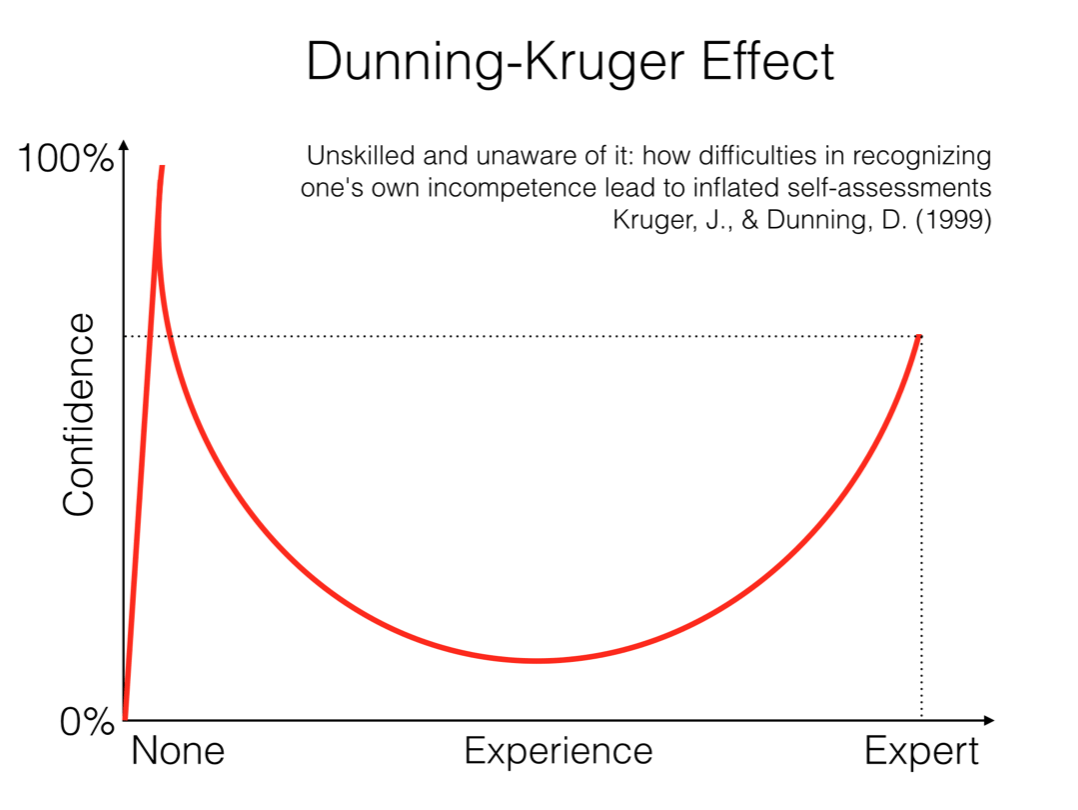
You are no doubt skilled in many areas, but if making high-quality job applications to professional roles isn’t one of them yet – you won’t fully demonstrate your potential and will fall down in graduate recruitment processes.
The good news is, making high-quality applications is a skill that can be developed.
I am going to level with you, completing graduate job applications can sometimes be frustrating and often a little bit tedious. That is all the more reason to get good at it so you waste as little time as possible.
Your university’s careers service are experts in helping you with this process, use them.
How could the Dunning-Kruger effect impact your performance in graduate recruitment processes?
There are three main areas of the Dunning-Kruger effect which can play out in graduate recruitment processes:
- Overestimating your own skill levels
- Failing to recognise the expertise of other people
- Failing to recognise your mistakes
Overestimating your own skill levels
If you are applying for a graduate role, all applicants are graduates. Around three quarters of graduates achieve a 2:1 or a 1st.
There are a usually a number of capable candidates that meet or exceed the core criteria. Simply having the required skills is not enough to guarantee success. Candidates need to clearly evidence that they have the required skills through utilising a range of examples and completing a range of tasks throughout the recruitment process. The strength of your evidence will determine how well you score in relation to a specific skill.
Crucially, so will how well you research the role, company, and sector; and evidence that understanding throughout the process. This is an area where a disproportionate number of students score poorly and fall down in the process.
Employers don’t expect you to be an industry expert – they do expect you to have done a reasonable amount of research before applying.
You will usually be assessed against a comprehensive indicator framework (including both positive and negative indicators) for each of the skills in the employer’s recruitment matrix.
Example competency framework with indicators:
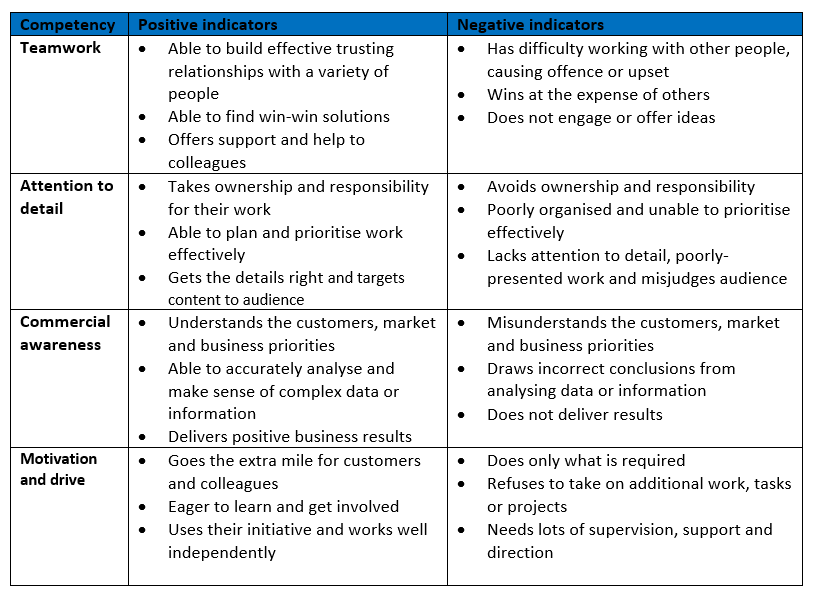
Example recruitment matrix (each competency tested twice):

Failing to recognise the expertise of other people
Being new to the nuances of graduate recruitment, students can often underestimate the skill and expertise of careers professionals and therefore many fail to engage with their university’s careers service. Those that do engage tend to come away with a much more positive perception.
The Dunning-Kruger effect could potentially lead some to presume that the recruitment process is inherently flawed because they believe if it was working properly, they would have been hired.
Are recruitment processes perfect? Definitely not. However, for most graduate schemes they are much more robust and valid than some candidates perceive.
Failing to recognise your mistakes
The Institute of Student Employers (ISE) recently released this graph showing the top reasons that stop students from getting the jobs that they apply for.
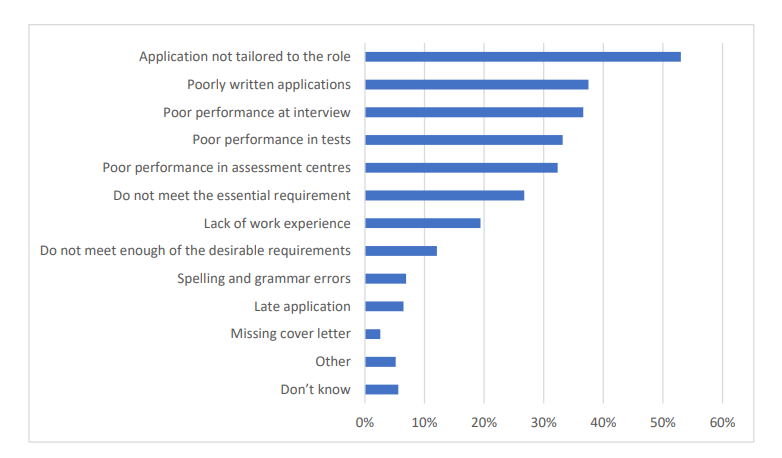
More than half of respondents agree that students are let down in their attempt to get a job by poorly tailored applications. Nobody who specialises in graduate recruitment doubts that students and graduates are highly capable and have a huge number of skills, but they can only score you based on the evidence you provide and your performance in the recruitment process.
You can fire out dozens of generic applications relatively quickly but ultimately it is a false economy as without proper research or tailoring to the role your chances of success are small. Below is what a typical recruitment funnel might look like for a graduate employer:
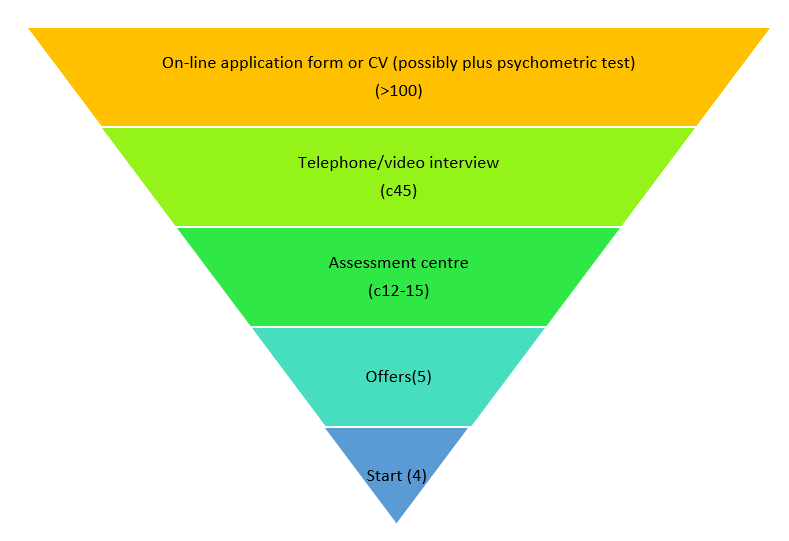
The initial application stage is statistically where most students fail in the recruitment process. Sending off generic applications and thinking you can then do the research if you get an interview is a mistake. You need to tailor the application and do your research to get the interview. This will take you longer than making generic applications but will have a much higher success rate.
The other side of the Dunning-Kruger effect
The crux of the Dunning-Kruger effect is that people are not very good at assessing their level of competence against others, it cuts both ways.
Therefore, although top-performers may realise they are better than average – they often do not realise how far from average their performance is.
So how does this play out in graduate recruitment? Highly competent people often self-select out of competitive graduate recruitment processes because they don’t realise just how good they are. This disproportionally impacts women.
How can you evidence your research to make tailored applications?
In a process where many graduates have similar grades and similar levels of experience, you can really improve your success rates by outperforming other candidates through the quality of your research and your ability to tailor your applications.
- Look into how they sell themselves. What makes them different to their competitors? They want to know that you understand their position in the market and want to work for them rather than you are just simply interested in their broad sector of work.
- Talk about specific tasks in the job description. Link tasks in the job description back to relevant projects, assignments, modules and work experience that you have already done.
- Show you understand the challenges of the role. Despite the glamour associated with some sectors, there are significant challenges such as working to tight timescales. They are not recruiting a fan – they want to recruit candidates who understand the reality of their world of work.
- What do they do at the site/office/division that you are applying to? For example, if you are applying to a global engineering firm, often only a small proportion of their products will be produced at the site you are applying to. Focussing in on those specific areas of their work will always be more relevant and impressive.
- Research the challenges facing their industry. Even a rudimentary Google search will bring up a range of articles for most industries, think about which will be most relevant to the organisation you are applying to – research a few more articles on those challenges.
- Look beyond the marketing rhetoric. Many employers will have promotional images of their graduates on an away day building a raft or have a prominent picture on their website to promote their corporate social responsibility (CSR) agenda, often of a well or school that they have helped to build in a far-off country. If you are applying for a commercial role in an oil company, it is unlikely the hiring manager is going to see these as relevant reasons to want to work for their company.
:star: #1 tip:
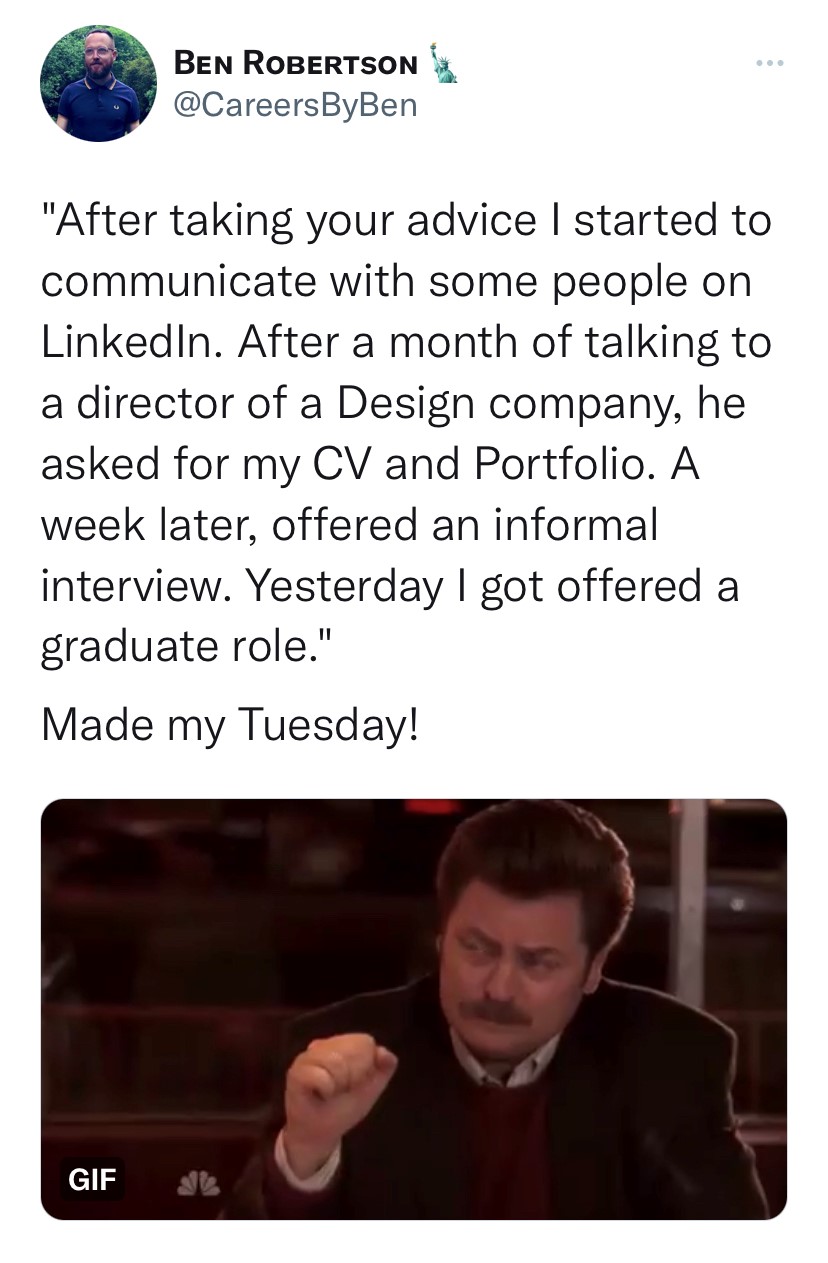 Speak to people already working in the industry. LinkedIn allows you easy access to millions of professionals already working in the companies and roles that you applying to. Start by searching for those that attended your university – this gives you a potential pool of warmer leads to contact. Make a very polite request to have a call to ask them about their experiences, some won’t respond but others will be happy to share their experiences. You probably wouldn’t walk up to a stranger in a bar and ask them to marry you, don’t contact someone you haven’t met and got to know and ask them for a job.
Speak to people already working in the industry. LinkedIn allows you easy access to millions of professionals already working in the companies and roles that you applying to. Start by searching for those that attended your university – this gives you a potential pool of warmer leads to contact. Make a very polite request to have a call to ask them about their experiences, some won’t respond but others will be happy to share their experiences. You probably wouldn’t walk up to a stranger in a bar and ask them to marry you, don’t contact someone you haven’t met and got to know and ask them for a job.
Very few students and graduates do this, and because of that, it can be really great way to gather market intelligence for recruitment processes, make a really positive impression with industry professionals and even may lead to securing a role.
Final thoughts
Being aware of the Dunning-Kruger effect can improve your self-awareness and make sure you perform to the best of your ability in the graduate recruitment process. At a practical level, taking the time to research the role, company and sector you are applying to is the best way to improve your success rate with applications.
You will have a huge number of skills to offer, developing the competence to fully evidence them in recruitment processes and tailoring your applications will ensure that you demonstrate your full potential to employers.
Your university’s careers service are the absolute experts for helping you develop this competence. They have loads of resources and teams of highly-skilled careers professionals to support you through every step of the process, it is crucial that you make use of them.
Big thanks to Mike Grey, Head of University Partnerships at Gradconsult, for writing this blog!
The longer original article can be found here: Could this be why students fall down in graduate recruitment processes? | LinkedIn
Please be reminded that if you need careers support, your Careers Team is only an email / a message away!
E: careers@westminster.ac.uk| Website | Facebook | Twitter | Instagram |Careers Blog
- An End-to-End Guide to Applying for Jobs: Where and When to Start! - 22 December 2025
- Graduate Success Series: a conversation with Ying Zhang - 18 December 2025
- Why Purpose is Your Greatest Asset in Higher Education - 23 October 2025
